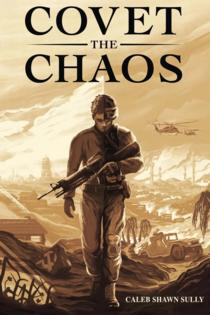Soldier seeks purpose beyond the battlefield in biographical fiction
Published in Mom's Advice
It is a grey November morning when an American foreigner in the Peace Corps makes his way through Ukraine aboard a cramped bus. Here, in an unfamiliar land, he hopes he can start fresh and leave his Army days and the war behind him, but he has yet to reconcile with a past he is trying to forget.
Inspired by author Caleb Shawn Sully’s own story, "Covet the Chaos" is a grueling and thought-provoking story of disillusionment, moral dilemmas and a foreigner who finds himself, more than once, lost in a foreign land.
"Covet the Chaos" follows an unnamed main character, who becomes the narrator in alternating chapters of the book. Readers soon become intimately familiar with this American man’s daily life, conflicts, deepest fears and desires. As a teenager, his mother, a single parent of four, couldn’t afford college and suggested the Army as the path to a debt-free education. It seemed like a good, simple solution that would be best for everyone involved.
But at a young age, the narrator soon finds himself moving from the classroom to the desert, living life as an Army-trained mechanic and Private in Iraq, not long after the events of Sept. 11, 2001.
It quickly becomes apparent that the narrator is the odd man out among his compatriots. He looks at the world differently and is sympathetic to the people whose homes they are invading, whose lives are being changed by the influence of American culture and violence. He ponders his purpose there, wondering whether what he and the other soldiers are doing is truly for the better.
In visiting a local museum, he thinks: “I was in a museum memorializing the victims of a brutal war while at the same time being a historical actor in a war.” How complicit is he willing to be?
When he befriends Zamir, a local who works on the base for eight dollars a day, whose son has been forced against his will to join al-Qaida, the narrator’s perspective widens. He grows sympathetic to these locals and knows they are separate from the people whom he is assigned to target — knows that they are all just humans trying to make it through, himself included.
There are, naturally, the classic moments you’d expect from any book on war — bullets flying, dangerous missions, near-death experiences, fear and triumph, but none of it is glorified or played for spectacle. It all serves to push the narrator’s journey and internal struggle forward.
These sections in the war are all told in first person, set in flashbacks between a more recent timeline, where he has made his way to Ukraine as part of the Peace Corps, tasked with teaching English to local children. “I’ll go abroad again, but this time, I’ll represent my country by doing something positive for the world!” Here, we see a different, more mature version of the narrator, struggling as he seeks redemption, a foreigner in a strange place once again.
Though the story refers to him as the foreigner, from his perspective, everything else in this country feels foreign. Here, he feels uneasy and isn’t quite sure why he’s in Ukraine, why he accepted the Peace Corps assignment, and why he feels a sense of melancholic dread.
Life feels uncanny for him, ever since the war, and in Ukraine, he is faced with an overwhelming feeling of being Other, of not belonging. Even as a teacher, there is a collective, cultural understanding that the children share, in which he can never partake. The sections set in Ukraine read like a fever dream, where strange, inexplicable phenomena occur, disorienting not only to the foreigner but also to the reader who too feels out of place — feels Other.
The two sections of the book serve as a fascinating contrast between soldier and foreigner, and both timelines inform the other to add richness to the novel. The narrator’s existence and people’s reactions to him are dependent on the context in which he is seen, and readers will understand that this is partially due to how he sees himself at that moment in life.
He is confronted with the complicated truths of being celebrated, welcomed and feared as an American soldier in Iraq, versus being met with unease, coldness and curiosity as an American English teacher in Ukraine.
"Covet the Chaos" explores themes of politics, morality, and free will, through philosophical debates among friends, strangers and soldiers. Rich, vivid descriptions make the novel read like part memoir part immersive history book, where you can imagine the sights, sounds, smells and atmosphere, with bits and pieces of other languages mixed in.
Caleb Shawn Sully shares the story of a soldier truly grappling with himself and his identity as he works through his lot in life and the decisions he’s made. "Covet the Chaos" is a sprawling novel that anyone interested in war novels and philosophical literary fiction is sure to enjoy.










Comments